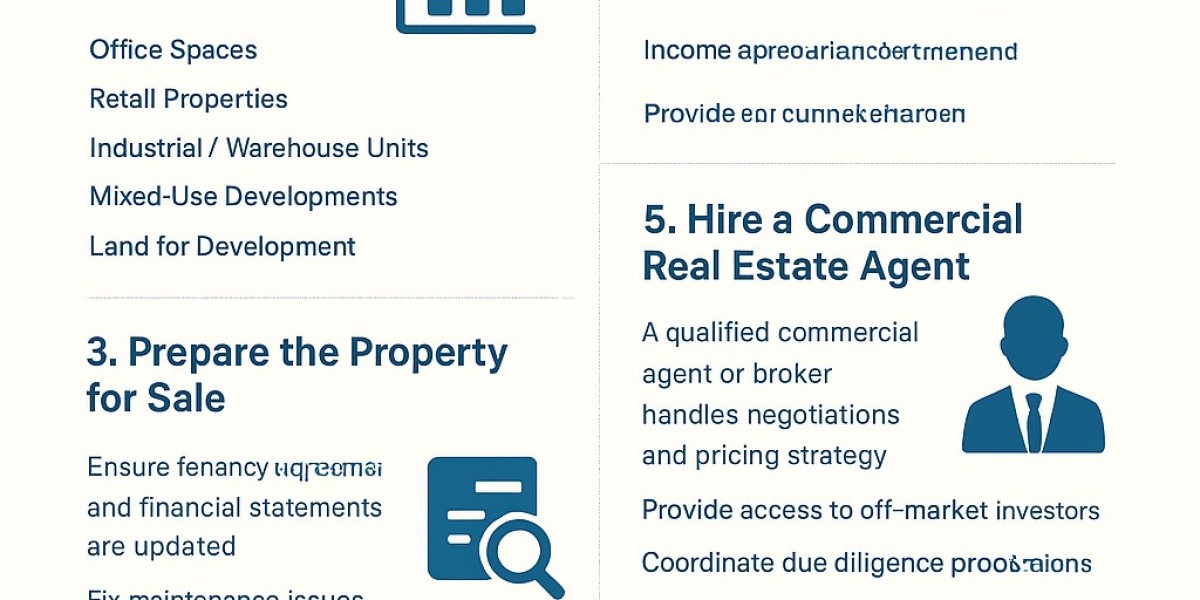Selling Commercial Property: A Complete Guide for Maximum Returns
Introduction
Selling commercial property — whether it’s an office building, retail space, or industrial unit — is a major financial transaction that requires planning, expertise, and market awareness. Unlike residential real estate, commercial sales are influenced by income potential, tenant agreements, and investor demand.
This guide walks you through the essential steps to ensure your property sells fast and for the best possible price.
1. Understand the Commercial Property Market
Before listing your property, analyze current market trends, demand cycles, and investor behavior.
Commercial real estate is often categorized into:
Office Spaces
Retail Properties
Industrial / Warehouse Units
Mixed-Use Developments
Land for Development
Research comparable properties (also known as “comps”) to understand what’s selling and at what price. Market timing plays a key role — a few months can make a significant difference in return.
2. Determine Your Property’s Value
Valuing commercial real estate is more complex than residential. Investors look at the income-generating potential and long-term yield rather than emotional appeal.
Key valuation methods include:
Income Approach: Based on the property’s rental income and return rate (capitalization rate).
Sales Comparison: Comparing similar properties recently sold in the area.
Cost Approach: Estimating value by calculating land and construction costs minus depreciation.
Hiring a licensed appraiser or commercial real estate consultant ensures accuracy and credibility with buyers.
3. Prepare the Property for Sale
A well-presented property attracts better offers.
Start by:
Ensuring tenancy agreements and financial statements are updated.
Fixing maintenance issues (roofing, HVAC, signage, landscaping).
Enhancing curb appeal to create a strong first impression.
Providing clear documentation such as zoning permits, tax records, and building certifications.
Buyers want transparency — clean paperwork and a property in good condition build confidence and reduce negotiation delays.
4. Market Strategically to the Right Buyers
Unlike residential listings, commercial properties target investors, corporations, and developers.
Use a professional marketing plan that includes:
High-quality photography and drone visuals
Listing on commercial property portals (e.g., LoopNet, Bayut, Property Finder, Rightmove Commercial)
Email campaigns and investor networks
Signage and virtual tours
Social media and LinkedIn marketing for global visibility
Highlight your property’s location benefits, tenant profile, and ROI potential to attract serious investors.
5. Hire a Commercial Real Estate Agent
A qualified commercial agent or broker is key to a smooth sale. They:
Handle negotiations and pricing strategy
Provide access to off-market investors
Coordinate due diligence and legal steps
Ensure confidentiality during corporate sales
Agents typically charge a commission (1–5%), but their market connections and negotiation skills can help you close faster and at a higher price.
6. Negotiate Offers and Due Diligence
When offers arrive, evaluate more than just the purchase price — consider:
Buyer’s financing strength
Proposed closing timeline
Any leaseback or occupancy conditions
Once you accept an offer, the buyer conducts due diligence, reviewing all financial, legal, and physical aspects of the property. Be ready to provide:
Rent rolls and tenant agreements
Maintenance and service contracts
Utility and tax records
Zoning compliance certificates
7. Close the Deal
After due diligence, the next steps include:
Signing the purchase and sale agreement (PSA)
Transferring ownership through legal channels
Paying any transfer taxes and brokerage commissions
Handing over documentation, keys, and tenant contact details
Your real estate attorney will ensure the transaction complies with local and national property laws.
8. Plan for Taxes and Reinvestment
Selling a commercial property may trigger capital gains tax or withholding taxes.
To optimize returns:
Consult a tax advisor before closing.
Consider 1031 Exchange (in the U.S.) or reinvestment programs to defer taxes.
Explore investment in other income-producing properties to grow wealth.








